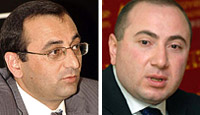“The government program, which the Armenian government is implementing is going to turn Armenia into a tax state,” yesterday said the head of the Politeconomia Institute of Legal, Political and Economic Studies, economist Andranik Tevanyan in Hayeli press club.
Speaking of the fact that the government is emphasizing the tax levying policy Tevanyan thinks the anti-corruption efforts which manifest themselves in a more rigid customs and tax administration are ineffective and dangerous for the economy. He says this policy turns Armenia into a tax state, underlying which is neobolshevism. In Tevanyan’s opinion when the budget filling becomes a super goal and everything is done to turn 1.7 billion into 2.5 billion the process becomes very dangerous. “The government states here is my economic policy. I collect money for the state budget to give it to the poor. It is nearly the same statement of 1917, land to farmers, factory to workers, as a result the farmer and the worker got no land and no factory. Now our government says we must collect as much money as possible to give it to the poor layers. First the businesses suffer, second it may sound vulgar but the officials also suffer because they are deprived of certain possibilities, the third layer who suffers is the poor people who are taxed the inflation tax. What does it mean? If you buy food and services more expensively, the poor suffer first. It is called the inflation tax. Now, on who is the policy of the government based, who is the social layer of the government. We should not forget that the government has a deficit of legitimacy. In this context, here is how they think. For legitimacy, we must tax the rich to the maximum extent, suffocate them, make them pay taxes to give the money to the poor and get legitimacy. In other words, the notion of election bribe is placed on state institutional mechanisms,” Andranik Tevanyan says. Tevanyan insured himself several times from being taken wrong by repeating that he is not against the fight against shade, He only offers to change the rules of the game, such as applying the progressive tax. In order to make it more understandable to the reader let us speak through an example. Let us assume the business is required to pay 20 AMD tax as defined by the law. By agreeing with the tax body he pays only 10 AMD and 5 AMD is paid as bribe and saves the 5. Now the government is trying to levy its whole 20 AMD but there is no guarantee that the tax body wouldn’t still claim his percent. It means that instead of the previous 20 the businessman will have to pay 25. In this regard Tevanyan thinks that the goods and services will rise in prices. In order to avoid this Tevanyan is offering to relieve the tax burden (to keep the businessman away from extra pressure) and only afterward go to strict tax administration. It is not right to glad about the fact that the tax body is punishing a businessman because as a result the economy suffers and no one benefits from that. The member of the ARF faction Artsvik Minasyan was against Tevanyan’s opinion that first the tax pressure must be relived and only then apply strict tax policy. Artsvik Minasyan thinks that only application can reveal the effectiveness of the current legislation and point to the necessity for change. “I agree that most members of the society prefer backdoor arrangements, including with the tax and customs services, because it gives them more privilege, competitive advantage. But was this dissatisfaction enough not to want a reform? I agree that the application of the law should be guaranteed which will reveal our competitive advantage on the Armenian market, where our policy should be directed at a more effective cooperation,” Minasyan says. Tevanyan objected by saying that in that case the economy may die. Both of the speakers retained their own opinions. During the debate the spokesmen also discussed the bill on raising the salaries of MPs and high-ranking officials. Minasyan, who is one of the authors of the bill said that it is strange that the monthly salary of the president is 400 thousand drams, less than the salary of the president of the Audit Chamber, which is 780 thousand drams. “We must tell the society the truth that we will pay so much as for every member of the society who fulfils their right to be convinced that a minister cannot live on 300 thousand drams,” Minasyan says. He justified the bill by the necessity of a common strategy of remuneration. In answer to the question of reporters which high-ranking official or member of parliament lives on their salary, Artsvik Minasyan says he knows members of government who lives on salary. Artsvik Minasyan mentioned the two new ministers of the ARF Dashnaktsutyun and the minister of finance Tigran Davtyan. “I mention those who I know,” Minasyan says. According to the MP event this small number of officials, who live with their salaries, must be encouraged. They shouldn’t suffer because of the undisciplined behavior of others. As of the ones, who are undisciplined the MP mentioned that they will supervise that they don’t miss the sessions with unsubstantiated absence. They will make sure their salaries are cut.
P.S. In the coming editions of our newspaper you may read the interview with Artsvik Minasyan. In this interview we will thoroughly speak about the above-mentioned legal initiative and the expected outcome.

